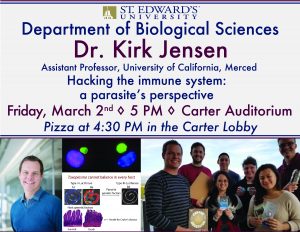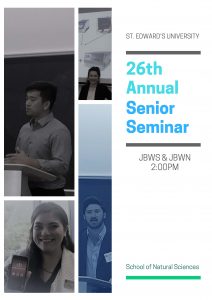The Department of Biological Sciences is pleased to host Dr. Kirk Jensen, Assistant Professor from the University of California, Merced. His talk is entitled: “Hacking the immune system: a parasite’s perspective”. Dr. Jensen‘s work further extends into the role of pathogens in auto-immune gut disorders such as Crohn’s Disease. Carter Auditorium. Friday 3/2 at 5 PM (pizza at 4:30 PM)
Monthly Archives: February 2018
Dr. Michael Reiser Seminar 2/26 5PM in Fleck 305
The Department of Biological Sciences is pleased to host Dr. Michael Reiser, a Senior Group Leader from the HHMI Janelia Research Campus for an upcoming seminar. His talk is entitled “Why are flies so hard to swat? The circuits and computations for motion vision in fruit flies”. Dr. Reiser is a pre-eminent scientist combining neurobiological, computer science, and engineering approaches to understand neurological control of animal behavior.
Fleck 305. Monday, 2/26 at 5 PM (pizza at 4:45 PM)
MIT Summer Research Program Info Session, Fri. 3/16 @ 3 PM in JBWS 267
Dr. Mandana Sassanfar (mandana@mit.edu) will be at St. Edward’s on Friday 3/16 at 3 PM in JBWS 267 to answer questions and establish connections with students interested in applying to the MIT Summer Research Program (MSRP) in Cambridge, MA. There is a Biology-specific MSRP and a general MSRP for other scientific disciplines. Information about both programs can be found here:
https://odge.mit.edu/undergraduate/msrp/
https://biology.mit.edu/outreach/msrp/
Please note that we are past the deadline for applying for this summer; this info session’s benefit is to lay the groundwork for future summer research. This is an excellent opportunity and experience for any student interested or curious about going to graduate school.
Department of Chemistry: Guest Speaker Series
2D or not 2D? Tribology, energy, and 2D nanomaterials
NSCI Chemistry Department hosts Dr. James D. Batteas, professor of chemistry at Texas A&M University, on Friday, 16 February at 3:00 p.m. in JBWN 206. An expert in surface chemistry and nanoscience, Dr. Batteas’ research focuses on the exploration and control of the surfaces and interfaces of materials, including the use of scanning probe microscopies to examine material properties on the atomic scale. His research group specializes in using nanomaterials and devices to develop custom-engineered surfaces and interfaces. They have developed a model platform to investigate the adhesive and fricational interactions at nanoscaled asperity-asperity contacts by using silica nanoparticles to for substrates with asperities of controlled radius of curvature (ca. 5-20nm), matching those found in many machined interfaces. In addition to the science of tribology, research activities and opportunities for REU experiences at TAMU will also be described.
Dr. Juan S. Ramirez-Lugo Biology Seminar 2/14 at 5 PM
Our Biology Seminar Series continues with Dr. Juan S. Ramirez-Lugo from the University of Puerto Rico – Rio Piedras, who will present a seminar about Science Education and Community building. He will also discuss the state of the island and science education in the post-hurricane environment. The seminar is at 5 PM on Wed. Feb. 14th in the Carter Auditorium, where no food is allowed so pizza will be served outside the auditorium at 4: 30 PM.
Hook Endowed Wild Basin Creative Research Fund Now Accepting Applications for 2018-19!
Deadline: Midnight, Friday, March 9, 2018
Scholarships up to $3,000 for Student Research Projects
The Wild Basin Creative Research Center is now accepting applications for 2018/19 research scholarships from the Hook Endowed Wild Basin Creative Research Fund. The Dr. Allan W. Hook Endowed Wild Basin Creative Research Fund offers awards up to $3,000 for creative research by students in the schools of Natural Sciences, Education, Behavioral and Social Sciences, Management and Business, and Humanities. The fund also offers research opportunities for undergraduate and graduate students from other institutions that are based at the university’s Wild Basin Creative Research Center and the Balcones Canyonlands Preserve system.
This year, the application process is through an online portal (here: Apply Hook Wild Basin Fellowship). Applicants should review the Fellowship Application Guide and Instructions, prepare their full proposal, and after review and approval from their faculty supervisor, submit it through the online portal. Interested students should contact the Wild Basin Director if they have questions. Descriptions of past projects supported by the Endowment can be found on the Research portion of the Wild Basin website.
We encourage you to share this announcement with faculty and students in your school and departments. We look forward to receiving a diversity of project applications from many academic areas!
This opportunity is made possible by the commitment and generosity of Dr. Allan W. Hook and Rosemary Guzman Hook, who established the endowment to honor Hook’s life work and dedication to providing students with opportunities both in and outside of the classroom. His philosophy is that “one can learn more from the natural world than from the human-made world.” The fund will promote a greater understanding of and appreciation for the Wild Basin Preserve and the Balcones Canyonlands Preserve system.
A recent article from the Toledo research lab
Colleagues,
Join me in congratulating the student co-authors of our lab’s most recent publication!
“The first structural model for the resting state of the active site of nickel acireductone dioxygenase (Ni-ARD)”
Inorg. Chem. Comm. (2018), 89C, 37-40.
You might recognize some of the names of students you have in class or had in class in the past. This work wouldn’t be possible without the generous support of the various sources of funding that make our summer research programs a success. A special thanks to my colleagues in the Chemistry department that supported this work and continue to support our science.
Sincerely,
Santiago





